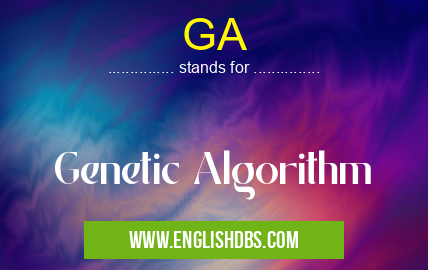What does GA mean in SOFTWARE
Genetic Algorithm (GA) is a search-based optimization technique which is inspired by the principles of biological evolution. It applies natural selection process to discover optimal solutions for an objective function. It iteratively improves a population of solutions, which are represented as chromosomes in the form of binary strings or real numbers, based on their fitness value. The goal of GA is to identify a solution that best fits the given problem whilst also being computationally efficient and it can be applied to a wide range of domains such as combinatorial optimization, function optimization, artificial intelligence and machine learning problems.

GA meaning in Software in Computing
GA mostly used in an acronym Software in Category Computing that means Genetic Algorithm
Shorthand: GA,
Full Form: Genetic Algorithm
For more information of "Genetic Algorithm", see the section below.
Meaning
In computing terms, Genetic Algorithm (GA) is an evolutionary algorithm that uses crossover and mutation operators on a population of candidate solutions or individuals in order to produce more fittest individuals with better chances of solving complex problems. To achieve this goal when using GA, firstly, initial potential solutions are randomly generated and then evaluated against the predefined objective function’s criteria. Based on those evaluations successive generations go through various steps like selection, crossover and mutation to produce better fit individual which eventually replace less fit individuals from the population becoming part of the new generations till desired fitness level is achieved by some individual or maximum number of generations have been traversed.
Full Form
The full form for Genetic Algorithm is GA, which stands for 'Genetic Algorithm'. As mentioned above, it is a heuristic search technique used to solve complex optimization problems that are difficult to solve using traditional algorithms, making its application versatile across multiple fields.
Essential Questions and Answers on Genetic Algorithm in "COMPUTING»SOFTWARE"
What is a Genetic Algorithm?
A genetic algorithm is a heuristic search method used in artificial intelligence that mimics natural selection and evolutionary processes. It works by taking a set of possible solutions to a problem and creating new solutions based on the behavior of existing solutions. The new solutions are then tested against the original problem and any that improve upon it are kept for future iterations. This process continues until an optimal solution is found or the best known solution becomes stagnant.
How does a genetic algorithm work?
A genetic algorithm works by taking input data, called chromosomes, which represent potential solutions to a given problem. The algorithms then evaluates each chromosome, or solution, according to how well it solves the given problem at hand. After evaluation, certain chromosomes undergo modification, swapping parts of their code with others. These modifications are made in such a way that they increase the chances of solving the target problem more effectively than before. The process repeats until an acceptable result is achieved.
What are some real-world applications of Genetic Algorithms?
Genetic Algorithms have many real world applications including scheduling problems such as assigning jobs to machines; drug discovery; portfolio optimization; game playing; predicting stock prices; image processing; transport network analysis and design optimization.
How do you determine when to stop running a Genetic Algorithm?
Determining when to stop running a genetic algorithm can be tricky because there is often no single answer as to when the best time is to stop running it. Usually, it depends on whether an acceptable result has been achieved or not - if so, the algorithm can be stopped immediately without any further processing required. Other factors that may influence this decision could include time constraints, budget limitations or other external factors.
Are there any drawbacks associated with using Genetic Algorithms?
Yes, there are some drawbacks associated with using genetic algorithms. These algorithms are unlikely to find global optima as they tend to focus on local optima instead. Additionally, they require lots of computation time due to their iterative nature and can be computationally expensive depending on how complex the problem being solved is.
What advantages do Genetic Algorithms offer over traditional methods?
Unlike traditional methods which rely on analytical approaches, genetic algorithms allow users to gain insight into problems through heuristic search techniques without needing to perform exact mathematical analysis in order to arrive at an optimal solution quickly. Their iterative nature allows them to explore multiple scenarios at once while avoiding getting stuck in local minima or maxima points which can prevent them from finding better results elsewhere.
What techniques can be used alongside a Genetic Algorithm?
There are several techniques which may be employed alongside genetic algorithms in order to ensure better results are obtained more quickly. These techniques include simulated annealing (SA), tabu search (TS) and evolution strategies (ES). By employing different combinations of these techniques alongside GA's users may find more optimal solutions faster than with solely relying on Traditional methods alone.
How do you initialize parameters for a Genetic Algorithm?
Before running a Genetic Algorithm it’s important that all its parameters are properly initialized according for tuning purposes in order for it reach its maximum potential for solving problems efficiently and accurately . In general , this involves setting up initial values for crossover rate , mutation rate , tournament size etc , so these values should ideally reflect what kind of task one want GA solve.
Final Words:
Overall, Genetic Algorithm (GA) has been successfully used for many real-world applications because it has the ability to quickly convergence toward better solutions even when dealing with large dataset volumes and multiple constraints where traditional algorithms might fail miserably or take too long for producing satisfactory solutions. Therefore it continues to remain popular choice among computing researchers working in optimiztion areas due its speed and reliability when compared with other methods available today.
GA also stands for: |
|
| All stands for GA |
